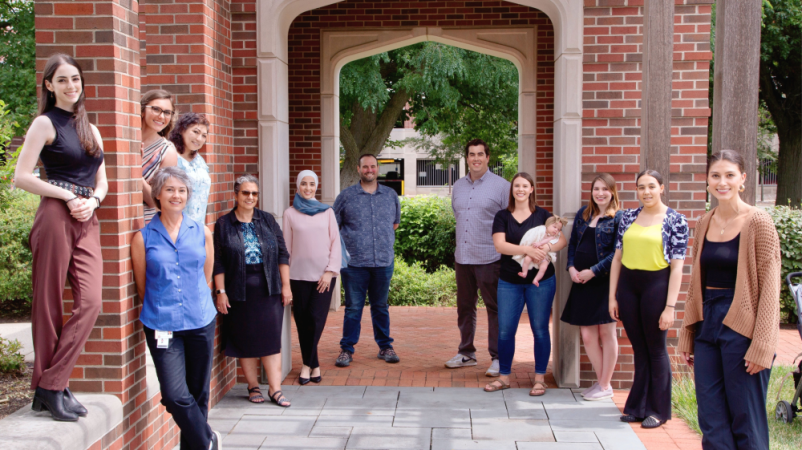
Riley Hospital for Children is one of eighteen Type 1 Diabetes TrialNet International Clinical Centers at the forefront of type 1 diabetes research. Led by Principal Investigator, Linda DiMeglio, MD, the TrialNet team at the Riley's is dedicated to preventing type 1 diabetes and stopping disease progression by preserving insulin production before and after diagnosis.
Our Team

Linda DiMeglio, MD, MPH
After graduating from Harvard University with honors, Dr. DiMeglio obtained her MD from the University of Pennsylvania in Philadelphia, PA and performed her residency in Pediatrics at Children’s Memorial Hospital (Northwestern University) in Chicago, IL. She completed her fellowship in Pediatric Endocrinology and received her Master’s in Public Health from Indiana University-Purdue University, Indianapolis. Since her fellowship, Dr. DiMeglio has been working in clinical research with a focus on Type 1 diabetes prevention and treatments, including new technologies and therapies for metabolic bone disease. She currently directs Riley Hospital’s participation in a number of type 1 diabetes research networks and supervises a research staff of 5 nurses and three technicians. She also collaborates on a variety of other translational and clinical research projects. She is an active clinician, seeing patients with diabetes and endocrine disorders in clinics, and she teaches medical students, residents, housestaff, and fellows.

Emily Sims, MD
Research interests include different pathophysiologic processes affecting beta cell function in Type 1 and Type 2 Diabetes; clinical interests include pediatric endocrinology and diabetes. I am originally from the Southeast, but have enjoyed living in the Midwest with my husband and two sons, and becoming a part of the Riley community.

Carmella Evans-Molina, MD
The long-range goal of the Evans-Molina lab is to define the pathways that govern beta cell function in states of health in order to understand how these regulatory circuits are impaired in the pathologic state of Type 2 diabetes mellitus. The major focus of the lab is to characterize changes in expression and activity of the sarco-endoplasmic reticulum Ca2+ ATPase or SERCA pump in the diabetic beta cell and to identify the downstream effects of SERCA dysregulation on ER calcium homeostasis, insulin production and secretion, and beta cell survival.

Heba Ismail, MD
Dr. Ismail attended medical school in Cairo, Egypt. She earned her MBBCh (MD) degree with honors from Cairo University, Faculty of Medicine in 1999. She completed her residency and pediatric endocrine training at Cairo University Children’s Hospital. Dr. Ismail later moved to the United States where she completed her US residency training at T.C. Thompson Children’s Hospital in Chattanooga, TN and her pediatric endocrine fellowship training at Seattle Children’s Hospital. Dr. Ismail became the Clinical Director of the Weight Management Program at Children’s Hospital of Pittsburgh in 2014 and the Clinical Director of the Diabetes Program there in 2016. Dr. Ismail joined the faculty at IU School of Medicine in 2018. She is board certified in Pediatrics as well as Pediatric Endocrinology. Dr. Ismail has a primary interest in type 1 diabetes research as well as clinical management of diabetes.
Maria Spall, RN, CCRP
Regional Affiliates
Research Studies
If you have a relative with T1D, you may be eligible for risk screening that can detect the early stages of T1D years before symptoms appear. More
Depending on your risk screening results, you may be eligible for monitoring. We’ll monitor you for disease progression and let you know if you become eligible for a study. More
We are testing the drug hydroxychloroquine (HCQ) to see if it can delay or prevent early stage T1D (stage 1) from progressing to abnormal glucose tolerance (stage 2) and ultimately prevent clinical diagnosis (stage 3). HCQ is already used to reduce symptoms and progression of other autoimmune diseases, such as rheumatoid arthritis and lupus. This is the first study to see if it can prevent or delay T1D. Details
TrialNet tested the drug abatacept to see if it could delay or prevent stage 1 T1D (two or more diabetes-related autoantibodies, but normal blood sugar) from progressing to stage 2 (abnormal blood sugar) or to stage 3 (clinical diagnosis). In an earlier study in people newly diagnosed (stage 3), participants treated with abatacept had 59% better insulin production and a 9.6-month average delay in progression of insulin loss compared to those who received placebo. That difference extended out to 3 years. Details
If you are diagnosed with T1D while participating in one of our prevention studies, we’re still here for you. You can continue to receive personal monitoring while helping us learn more. More
TrialNet is testing the safety of a new treatment, NNC0361-0041, in adults diagnosed with type 1 diabetes (T1D) in the past 48 months. This is a Phase 1 study, which means it is the first time this treatment is being tested for safety in people. If this study results in no safety concerns, we plan to conduct a larger study to see if this same treatment can slow down or stop T1D in people at high risk, before clinical diagnosis. More





